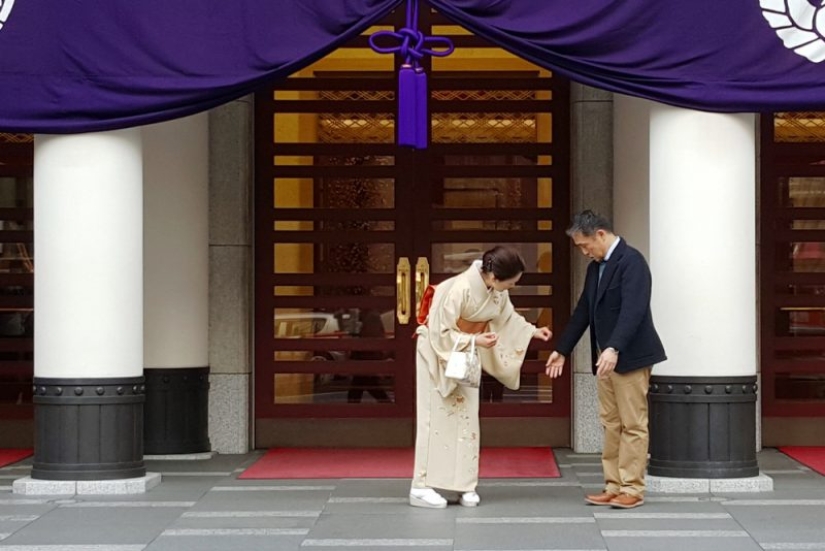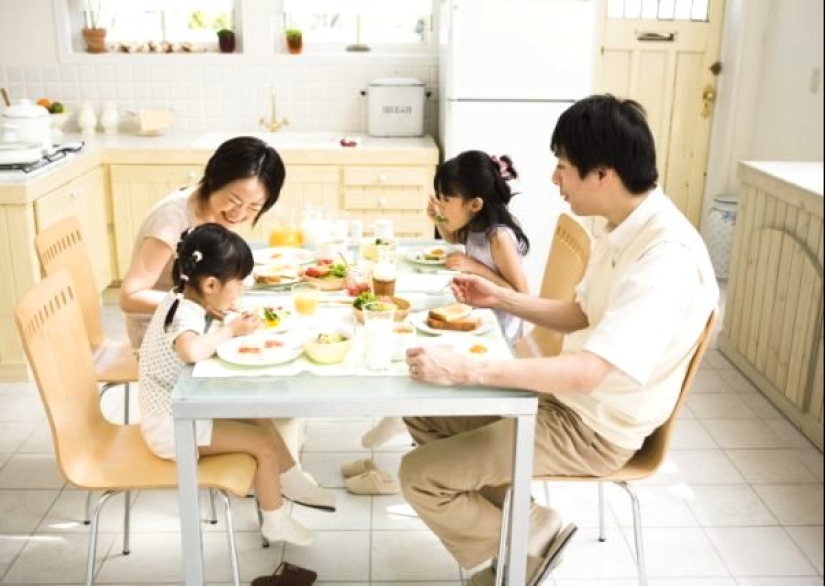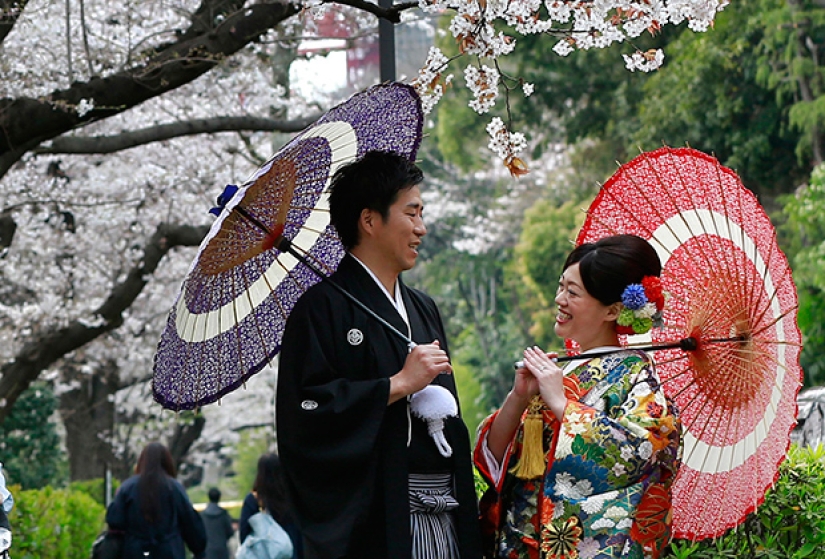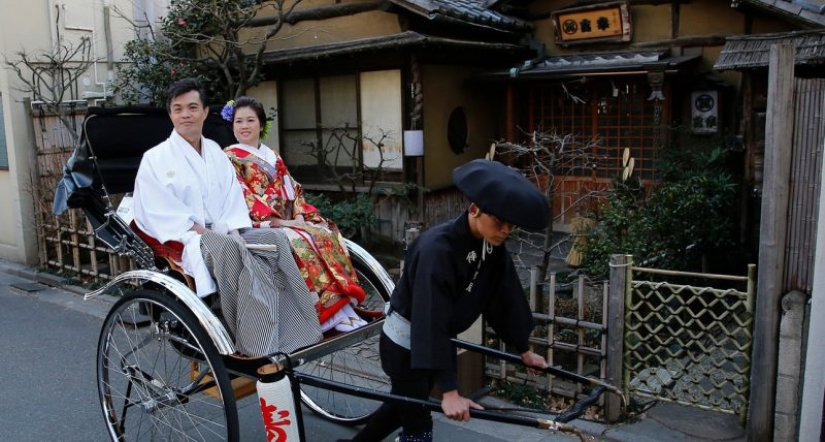What does it feel like to be a samurai's wife? Family traditions of medieval Japan in the XXI century
Categories: Asia | Nations | Society | World
By Pictolic https://pictolic.com/article/what-does-it-feel-like-to-be-a-samurais-wife-family-traditions-of-medieval-japan-in-the-xxi-century.htmlJapan is a country of centuries—old traditions. Despite the colossal scientific and technological leap, this country is in no hurry to reconsider its centuries-old views on life, including family life. Patriarchy reigns in the Land of the Rising Sun, and in a form unknown in any other country in the world.

Instabloger @mariiarichard, who has been living in Japan for years and knows firsthand about the mentality of the inhabitants of this country, told Cosmopolitan journalists about what it's like to be the wife of a real samurai. The woman shared with us information about how the family life of a Japanese spouse looks without embellishment and romance.
It all starts long before the Japanese woman meets her future couple. From early childhood, girls are taught that their main task is to find the most successful option for creating a family and later devote themselves to the hearth completely, without a trace.

We can confidently say that parents are engaged in the upbringing of an ideal Japanese wife immediately from the moment of birth of a female child in the family. Everything is subordinated to the interests of the upcoming marriage. Even education is chosen in such a way that, if possible, it helps to arrange a profitable match for the girl.
If a girl has a brother, no matter older or younger, then from a very young age she observes the difference in attitude towards male and female children. Boys are treated much more respectfully, they listen to their wishes and spoil them more often. The son is not required to do what is mandatory for the daughter.
Such a different attitude towards children is visionarily designed to demonstrate to girls their second-rate status and prepares them to be with a man in the role of a servant. In the family, the Japanese woman is quiet, helpful, laconic and always friendly.

The advocates of patriarchy often engage in polemics with opponents who condemn such a course of affairs. The favorite arguments in this case are the romanticism of relationships peculiar to the Japanese, beautiful courtship and a reverent attitude towards lovers. But these are all stories for foreigners who do not know Japanese realities.
In fact, nothing described above is in sight. Japanese gentlemen, most often, come on dates empty-handed, and if the meeting takes place in a cafe or restaurant, then they pay exclusively for themselves. The candy-buffet period of the relationship is completely absent — there are no flowers, no walks under the moon, no hot vows of loyalty to the grave.
Making a digression, let's say that in Japan it is generally not customary to make spontaneous gifts, and even more so to women. For a long time it has been believed that if a lady needs something, she will ask her spouse to buy it for her, and if she is silent, then she has everything she needs and gifts are not needed.

Things are even worse for the Japanese with the manifestation of tender feelings. In Japan, it is customary to be prim and reserved, even in the family circle. Manifestations of love and tenderness in public are condemned, and this applies not only to spouses, but even grandmothers and grandchildren.
Japanese dating consists of conversations, walks, trips to the cinema, and it is also not customary to take hands. Everything about love can only happen between two, behind closed bedroom doors, without bystanders. Japanese men make a marriage proposal quickly and busily, and it is not accepted to give romanticism or at least solemnity to this important event.
It happens that everything happens in the living room on the couch while watching an action movie. The man is distracted for a moment and asks his beloved — "Will you marry me?". Having received the answer, the guy immediately continues the interrupted lesson and does not exchange for sentiment anymore.
Despite such a stripped—down version of the proposal, any Japanese girl at this moment considers herself the happiest in the world, because there is only one step left to the goal of her life - marriage. Soon she will become a legitimate spouse, which means that her main purpose in life is almost fulfilled.

The family life of a Japanese woman can easily be described in just two words: submission and work. There are only two scenarios of female happiness. In the first case, the wife works at a hard and often low-paid job, giving her earnings up to a penny to families. In the second case, the other extreme, since in this case the spouse should forget about work and hobbies and devote herself completely to family and children.
After marriage, women are not forced to leave work — she is free to choose the scenario of her future life. A wife can even make a career, but with one important condition — this should not prevent her from taking perfect care of her family.
All household chores in Japanese families are the prerogative of the spouse. A man doesn't do anything around the house at all. He comes home from work and his main task is to rest. Even such small tasks as garbage removal should not be performed by Japanese husbands. At the same time, the Japanese demand from their wives perfect order and cleanliness in the house.

In Japanese families, the concept of "pure" is different from ours. This means absolute, perfect purity, at which it is impossible to find even a speck of dust. The wife, in order to have time to do all her homework, gets up before dawn. She prepares breakfast for her husband, since in Japan the working day always starts early, at 8 am.
Often men want to have lunch prepared for them, which they can take with them to work and eat during the break. Here you can add the fact that breakfast and lunch should also be prepared for all children, and it is important not only to cook delicious, but also to arrange everything beautifully.
Japan is not called the Country of white—collar workers for nothing - they are really always snow-white there. Of course, this is the merit of Japanese wives who zealously take care of their men's wardrobe. A Japanese person can spend 12 hours a day at work and all this time he must look flawless. Of course, you can use laundry services, but one service service will not do this work flawlessly and at the same time absolutely free of charge.
Cooking dinner for her husband, the Japanese wife will not be able to get off with one dish. Here are accepted pickles placed on the table in small bowls. Semi—finished products and primitive "fast" dishes do not pass here - it will not work to boil borscht or mashed potatoes, and then only warm them up.

You will have to cook daily, while seriously straining your imagination to repeat as little as possible. After the meal is over, the wife cleans the table and washes the dishes herself — the husband will not touch this work with a finger. Raising and caring for children is also the responsibility of a Japanese wife.
After a long working day, a self-respecting samurai will go to a bar with friends, where he can seriously linger. The husband does not leave the feast until his boss leaves home and this rule is sacredly observed by all men. Therefore, Japanese wives are usually alone in the evenings.
After work, some men also go to a brothel to "relieve stress" — in Japan, the sex industry is extremely developed and the stronger sex sees nothing reprehensible in such leisure, even having a legitimate spouse at home. While the husband is drinking or having fun with the girls in a special hotel, the wife must prepare his bed. In most Japanese families, the husband and wife sleep separately so that the man can get a good night's sleep before the working day.

If the husband did not come to spend the night at all, then it is not accepted to ask why this happened. And it is absolutely inappropriate to arrange a scandal for your spouse. Men's affairs do not concern women and this is a very important rule of a happy family life.
All adult residents of Japan are well aware of the expression "Danson dzehi". Literally, it means "respect for a man, contempt for a woman." This rule was the basis of family relations before and remains relevant in modern society more than ever.
Such a scheme of relations is well illustrated by one small feature of family life. In Japan, a wife calls her husband "you", while a man says "you" to his wife. There are a lot of such talking little things and from them there is a general dismissive attitude towards a woman, at first glance, imperceptible.

Any married Japanese is firmly convinced that his duty to his wife is fulfilled by the fact that he provided her with a roof over his head and money. This is where his mission ends and his wife's worries begin. Husbands are sure that they do not require anything special from their halves — just care. And they will not tolerate if a woman does not live up to expectations.
Japanese psychologists claim that most scandals in modern Japanese families occur due to the fact that the wife expresses her opinion on some issue that her husband is absolutely not interested in. It is important for the Japanese to "save face", so it is not accepted to make a row in the presence of outsiders.
However, in the Land of the Rising Sun, you can often see a scene when a woman in the middle of the street proves something to the red about the rage of a man who is not averse to even attach a debater. On the street, the husband will not hit his wife, but at home, most likely, he will give free rein to his hands and tongue.

Statistics show that up to 30% of married Japanese women face domestic violence. It is not difficult to meet a woman on the streets, with bruises artfully smeared with foundation — this does not surprise anyone. Interestingly, the statistics concerning family assault were obtained first-hand, thanks to anonymous surveys. A Japanese woman will never go to the police to complain about an aggressive husband.
Despite all this, the divorce rate in Japan is very low. Anonymous surveys have shown that 62% of married Japanese women dream of divorce. But very few people decide on it. Although Japanese husbands, in most cases, behave nobly and do not deprive the former spouse of a roof over her head and property, secretly every Japanese woman is afraid of this. Many women, having devoted themselves to home and husband, quit their jobs and careers, and some never worked at all. Wives are afraid of being left without means of livelihood, so they tolerate the most outrageous antics of their spouses.

The younger generation of Japanese is gradually retreating from the old rules. On the streets and in parks, it is increasingly possible to see fathers who are happy to walk with baby strollers, and many young husbands do not consider it shameful for themselves to help their spouse with the housework. Sometimes couples even organize their own business, in which the spouses are equal partners.
From all this, we can conclude that even in conservative Japan, which has been soaked through with the most extreme patriarchy for centuries, changes are taking place for the better today.
Recent articles

It's high time to admit that this whole hipster idea has gone too far. The concept has become so popular that even restaurants have ...

There is a perception that people only use 10% of their brain potential. But the heroes of our review, apparently, found a way to ...

New Year's is a time to surprise and delight loved ones not only with gifts but also with a unique presentation of the holiday ...